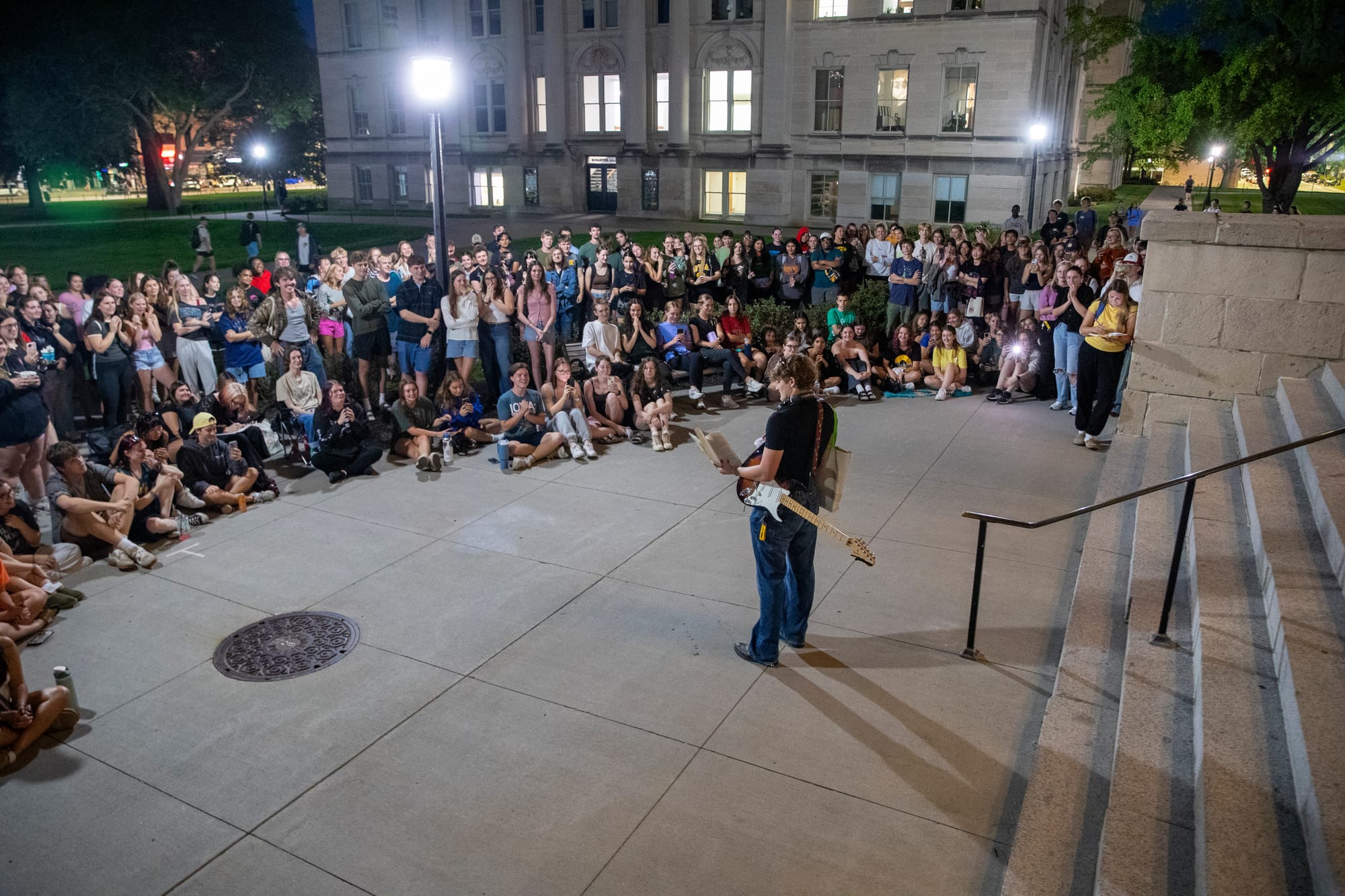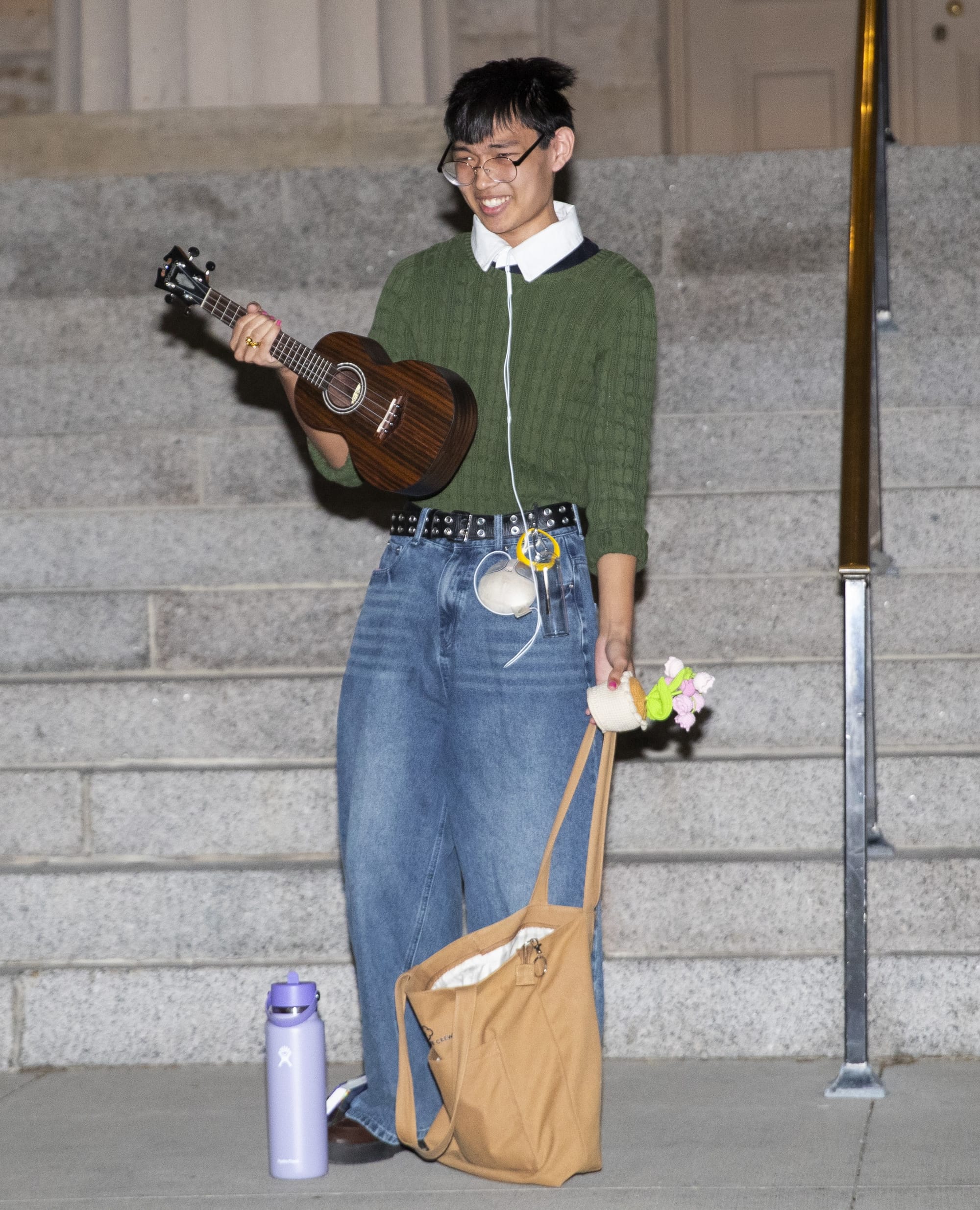I Went to a Charlie Kirk Vigil, it Turned Out to be a Performative Male Contest
This is one of those instances that turn out much better than you expected.

I spent much of the afternoon on September 10th reading the reactions online of people gawking at Charlie Kirk’s assassination. In what’s been the latest result of the American Year of Lead and Etsy witch success, the conservative commentator and grifter was shot through the neck on a campus visit to Utah Valley University. His blood fell out of his head while sitting under a banner that said “Prove Me Wrong”. Later that night, I got a tip from a friend saying that there was going to be a vigil held by the University of Iowa’s Young Americans for Freedom at the Pentacrest in Iowa City at 8:00 PM in the memory of Kirk. I decided to go to keep tabs on what they were doing and judge from afar.
Walking to the Pentacrest, I was a little conscious that they might realize I wasn’t there to mourn. I wasn’t dressed in the typical young conservative uniform of either an ill-fitting formal suit, or an Under Armor hoodie and basketball shorts. Instead I was wearing khakis with a blue striped t-shirt, Birkenstocks so I could let the blisters heal, a black dad baseball cap over my floppy brown bob, white Apple wired earbuds dangling down into my pocket, and a Classic Penguin Books tote that I brought to pick up textbooks for me and my brother right before.
When I got to the Pentacrest, there were around a hundred people circled in front of the steps of the Old Capitol, roaring in applause intermittently. A guy in the middle wearing JNCOs and holding a satchel was raving about feminism. The vibe seemed too ironic. I asked a person in the audience if the YAF was here, and they told me it was like a performative male contest. Taking one look at me, they then instructed me that the line to compete was over on the right.
The performative male archetype or stereotype has been around for the past year, but has ballooned in popularity over the past month with people making memes on the trend which then got covered by large media outlets’ fashion blogs. The performative male tag has been used to identify the type of guy who adopts feminine interests, cultivating a false appearance, and faking a leftist ideology to get with progressive women. It’s a new class of male manipulator. As with most things on the internet now, the performative male has been aestheticized until it was stripped of its original meaning, with numerous photoshopped style sheets sprouting up online, and people posting their own cosplayed outfits.

I feel as though I had no option but to go over and wait in line. I was surrounded by other alternative looking boys in khakis, with striped sweaters over collared shirts. Some wore wrap-around sunglasses, while others held green matcha lattes. Almost all of them had tote bags hung over their shoulders. It felt like I had just walked off a New York City subway platform.
Several people took their turn walking under the spotlight in front of the judges and audience. One guy walked out reading from two opened books, one in each hand, describing how much he loved feminist literature and talking over women about it. A lesbian dressed in the aesthetic said how men shouldn’t be appropriating carabiners. Another boy pulled out a Miffy keychain and a Björk record, describing how much he loved the higher audio fidelity of vinyl. With every cliche the contestants gave into, the crowd erupted in cheers. The YAF must’ve realized they had a lost cause when they saw this.
A contestant named Jean Luc went right before me. He spoke in a faked French accent, and then started playing “Wonderwall” on his acoustic guitar. I went up, gave a land acknowledgement, told the crowd how I was a gay boy who thought they were showing up to a wannabe fascist conference, and then started talking about my outfit and niche art tastes. I had a script about slowcore and Title Fight that I was going to say, but I got flustered and lost the plot, so I just walked off before I embarrassed myself. I was followed by a guy who just revved his motorcycle, and another professing about how much he loved women.
The top contestants were brought up for a final vote. One of them, a frat bro referred to just as “Roofie Guy”, was disqualified for being too wack and annoying. They had the crowd cheer for who they thought was the best, and the most stereotypical performative male won out.

I asked the people around me how they found out about the event. Most said they just saw it posted earlier in the day, or heard about it at lunch from some of their friends. They put together their outfits and characters in just a couple hours. It all was very spontaneous. One of the people I asked said her friend had put it on, so I asked her if she could point them out.
A guy named Aidan had organized the performative male contest after seeing other cities do the same. He was dressed for the part with cut-off jean shorts, and a tight gray tank top under a camo hunting jacket. People said he looked like Benson Boone with his curly fade and mustache. He initially just posted the event to Yik Yak, where it then spread even further. He said he wasn’t expecting the event to be anywhere near this big, but was really impressed with how it turned out.
One of the judges, Kat, said that she didn’t know about the event until earlier in the day, where she said she was incorrectly clocked as bisexual by Aidan at the university library and asked to judge all these posing sensitive boys. She agreed and brought a couple of her friends on as judges.
Despite the sarcastic tone of the event, its ironic jokes on toxic masculinity, and its origins from a terminally online trend, the performative male contest felt very human. It was a large function that brought a group of strangers together, from an online space into the real world. People were talking to others they never met before, all while joining in the collective laughter at people who were purposefully making themselves into caricatures. It was a stark contrast to all the passive aggressive comments and debates that scattered online spaces that day, and the general university atmosphere that can construct a feeling of social isolation. As more people stumbled across it, the event only continued to grow. The performative male contest was an impulsive gathering that utilized a communal space, something way more valuable than a hollow memorial service for a legit misogynist.
